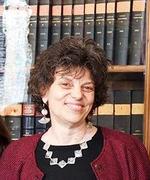Silvia Bordiga
Professor
- Department of Chemistry
- SSD: CHIM/02 - physical chemistry
- ORCID: orcid.org/0000-0003-2371-4156

Contacts
- 0039 011 6708383
- 347 0974482
- Call silviabordiga
- silvia.bordiga@unito.it
- Via Quarello 15
- https://www.materials-science.unito.it/persone/silvia.bordiga
At
- Department of Chemistry
- Dipartimento di Chimica
- Corso di laurea in Scienza dei Materiali
Corso di laurea in Scienza e Tecnologia dei Materiali - Corso di laurea magistrale in Chimica
- Corso di studi in Chimica
- Master degree in Materials Science
- PhD in Chemical and Materials Sciences
Curriculum vitae
 Curriculum Vitae
(0.8 MB)
Curriculum Vitae
(0.8 MB) Selected research products
Courses
- CATALISI (CHI0050)
Corso di laurea magistrale in Chimica - Catalisi eterogenea (Vecchio Ordinamento D.M. 509) (S8248)
Corso di studi in Chimica - Chimica Fisica III (Nuovo Ordinamento D.M. 270) (MFN0463)
Corso di studi in Chimica - Chimica Fisica III (Nuovo Ordinamento D.M. 270) (MFN0463)
Corso di studi in Chimica - Chimica fisica F (C8065)
Corso di studi in Chimica - Materiali per l'energia con laboratorio (MFN1258)
Corso di laurea in Scienza dei Materiali
Corso di laurea in Scienza e Tecnologia dei Materiali - Physical Chemistry (MFN1343)
Master degree in Materials Science - Surface phenomena at the micro and nano scale (CHI0156)
Master degree in Materials Science
Research topics
Research interests
I have always applied spectroscopic methods in order to achieve a detailed understanding of the physicochemical nature of a large variety of nanostructured high surface area materials that find applications as heterogeneous catalysts. The peculiarity of my work is to develop a versatile experimental platform based on the combined use of laboratory spectroscopies and advanced techniques available at the synchrotron beam lines in controlled atmosphere. Broad aim of the work is to describe the structure and the number of the active sites; the reaction mechanisms; the origin of catalysts deactivation. Most of these activities are performed thanks to the collaboration with industrial partners. Relevant examples are: TS-1 (Titanium silicalite) a unique catalyst for selective partial oxidation with H2O2; 2) Fe-Zeolites, a relevant catalyst in partial oxidation with N2O; 3) H-Zeolites used for Methanol to hydrocarbon/olefin processes; 3) Cu-exchanged zeolites for ammonia selective catalytic reduction. More recently I’m actively contributing to the development of the emerging field of Porous Metallorganic Frameworks, both contributing to the understanding of known materials and developing new ones for specific applications (e.g. in collaboration with Oslo University: discovery of UiO-66 metallorganic framework topology that is a very thermal and chemical stable metallorganic framework now commercialized; in collaboration with Berkeley university: disclosure of the reaction mechanism of CO2 adsorption on post-synthetic modified metallorganic framework). The commune denominator of my interests is the broad concept of sustainability, strongly interconnected with the energy efficiency and of the integration of resources (possibly renewable) in order to allow a sustainable grow of our society.
Research groups
Research projects
Activities in agenda
Academic bodies
Office hours
Su appuntamento previa comunicazione via posta elettronicaThesis, work placement and internship offers




